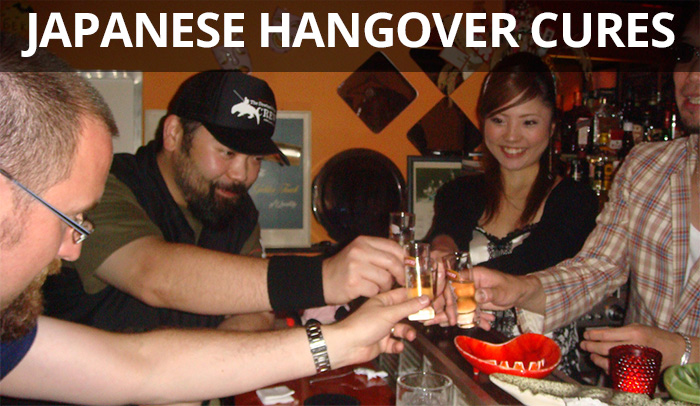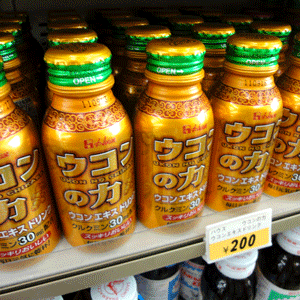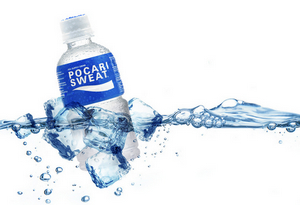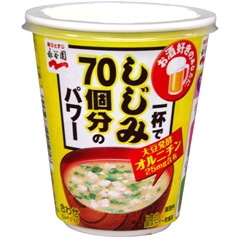
During a recent conversation with a friend of mine with both German and Japanese heritage, I was made aware of the (pretty large) market of Japanese hangover cures. From hangover drinks to hangover pills and powders, there is a large selection of products designed to cure Japanese men and women of their numerous pains caused by a little too much alcohol consumption. Some are modern adaptations of ancient traditional cures, and some are actually pretty genius in their use of specific ingredients that have been scientifically shown to help with hangover symptoms.
As ‘experts’ on the hangover (I mean, we have created the #1 rated hangover cure on the market, wink wink!) it was only right that we look into the numerous Japanese hangover cures available and determine what is valid and what is more of a placebo.
They say that the only way to 100% guarantee not getting a hangover these days, is to not drink alcohol in the first place (thank you every ‘captain obvious’ who points this out to me when I mention this website) but in Japan… ‘not drinking’ isn’t really an option!
Japanese Drinking Culture
I’ll explain: alcohol consumption is a part of even the most sacred Japanese ceremonies. Virtually all festivals, celebrations and ceremonies include at least a little consumption or offering of alcohol.
Drinking alcohol is also a key part of building bonds, friendships and lasting relationships with workmates and business contacts in Japan, so being ‘that guy’ who doesn’t drink is likely to mean you don’t progress in your career as fast as others.
Knowing that, it’s not a big surprise that the smartest minds in Japan have focused their efforts on creating and making effective hangover cures available to the public! It’s not a luxury concept in Japan – it’s a necessity!
An evening of 飲み放題 or nomihōdai in Japan is often seen as the holy grail of budget boozing. Essentially, it’s an all-you-can-drink offer, provided in many Japanese clubs and bars, for a fixed price and period of time. If you have an nomihodai session scheduled, to make sure you don’t end up throwing up and sleeping in a ditch, it’s best to know what the Japanese consider the best hangover cures and drinking companion products before you get started…
Japanese Hangover Drinks
The first product to be aware of, which can serve as a ‘pre-drinking’ aid (to be consumed before you start alcohol consumption to lessen the effects on your body) or as a ‘post-drinking’ hangover cure, is ukon.
Ukon no Chikara
 Ukon is a kind of turmeric that can be found mixed into a super-sweet sugary drink called ウコンの力 or ‘Ukon no Chikara‘ in most convenience stores. The (large amounts of) sugar is to hide the taste, which is actually quite awful on its own, but bearable within this drink.
Ukon is a kind of turmeric that can be found mixed into a super-sweet sugary drink called ウコンの力 or ‘Ukon no Chikara‘ in most convenience stores. The (large amounts of) sugar is to hide the taste, which is actually quite awful on its own, but bearable within this drink.
The folks over at Epicurious recommend “chugging one of the 3.4-ounce bottles before drinking” as the beverage has a high concentration of curcumin, an active ingredient of turmeric, is believed to enhance liver function.
Here’s the authors thoughts after trying a sugar free Ukon drink called ‘Ukon Power‘:
Ukon Power smells like a cross between Red Bull and cough syrup, although, unlike Red Bull, it’s sort of viscous — not fizzy. The drink, which doesn’t contain any sugar or caffeine, is billed as “mild and refreshing.” And while it’s definitely mild (the strongest taste is the artificial sweetener, not the turmeric), thick medicinal-smelling orange liquid isn’t exactly what you want to be sipping on an 80-degree night. (Maybe if you grated some ginger in it? And poured it over ice?)
The next morning I felt great! Like I didn’t even drink the night before! But, to be fair, this may have had just as much to do with all the water I was drinking between cocktails (it was 80 degrees, remember) as with the Ukon.
Pocari Sweat
 The easiest way to describe this hilarious sounding drink is simply; Japanese Gatorade. It doesn’t contain any secret ingredients or ultra effective ‘ancient herbs’, it’s more of a solid energy drink that’s good for giving you that bit of energy to head to the shops or order a pizza 😉
The easiest way to describe this hilarious sounding drink is simply; Japanese Gatorade. It doesn’t contain any secret ingredients or ultra effective ‘ancient herbs’, it’s more of a solid energy drink that’s good for giving you that bit of energy to head to the shops or order a pizza 😉
Aquarius is another well-known Japanese Gatorade that’s good for an energy boost.
Kabakawa A, Sorumakku & Hutukayoi Nomisugiru & Other Japanese Hangover Helpers
There are several Japanese hangover tonic drinks available from most convenience stores, and they are often switched out and replaced with new products or better sellers. Some are effective and some are just placebos, it really is hit or miss.
If you’re in Japan and looking for a hangover tonic at a convenience store or pharmacy but cant find it, use the word ‘Futsukayoi‘ or show them the Japanese word for hangover: (ふつかよい / 二日酔い). Here’s an audio clip so you can get the pronunciation right:
Japanese Hangover Pills & Sachets
SLated as a more effective version of the Ukon no Chikara drinks are the pill or sachets forms of pure ukon (ukon means tumeric, remember) that can be purchased from pharmacies and some convenience stores.
With the sachet powder, make sure you have something to wash it down with as I can only describe the taste as puke-worthy‘garden-mulchy‘. In fact I’m convinced that it tastes so bad, that it HAS to be more effective than the drink equivalents.
Miso Soup
Shijimi Miso soup is a delicious soup with lots of little clams that are said to be restorative and good for the liver. Miso is apparently chock full of beneficial bacteria, enzymes and nutrients that can help undo some of the damage alcohol has done to your system. For additional proteins and amino acids, consider a side dish of umeboshi plums: pickled plums. They’re super tart and salty and taste approximately like somebody tried to cross a peach with an olive… very strange indeed.
 In Japan some companies even market special ‘hangover cure miso soup’ like Nagatani-en whose packaging specifically shows a beer glass with the words “For people who like their drink”…
In Japan some companies even market special ‘hangover cure miso soup’ like Nagatani-en whose packaging specifically shows a beer glass with the words “For people who like their drink”…
If you want to make miso soup at home, you can either use miso soup paste or the instant miso soup version – worst case scenario you have a delicious breakfast.
Japanese Raisin Tree
Hovenia dulcis, the Japanese raisin tree or oriental raisin tree, is a tree found not only in Japan but all over Asia, Eastern China (萬壽果) and Korea (헛개나무) to the Himalayas (up to altitudes of 2,000 m), growing mostly in a sunny position on moist soils.
The Japanese Raisin Tree is a source of dihydromyricetin (Ampelopsin) and has traditionally been used as an anti-Alcohol herb and hangover cure. At least one human study has noted that, when taken before drinking, it can reduce circulating levels of alcohol and negate the effects of alcohol. Dihydromyricetin is the main ingredient of our very own Sobur hangover pills, which you can read more about here.
